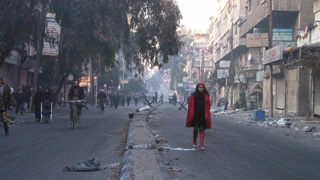Little Palestine, Diary of a Siege
Little Palestine, journal d’un siège LEBANON, FRANCE, QATAR / 2021 / Arabic / Color / DCP / 89 min
LEBANON, FRANCE, QATAR / 2021 / Arabic / Color / DCP / 89 min
Director, Script: Abdallah Al-Khatib
Photography: Abdallah Al-Khatib, Basel Abdullah, Yahya Diaa, Mohamad R.M. Hamid, Majd M.A. Almassri, Mouayad Zaghmout, Qusai Abu Qasem
Editing: Qutaiba Barhamji
Sound Design and Mix: Pierre Armand
Producers: Mohammad Ali Atassi, Jean-Laurent Csinidis
Production Companies: Bidayyat for Audiovisual Arts, Films de Force Majeure
Source, World Sales: Lightdox www.lightdox.com
The director sheds light on the everyday life of the Yarmouk Palestinian refugee camp in his native Syria, shooting from 2013 to 2015. While the camp had some support from the Syrian government before, now it is enclosed by roadblocks and facing food shortages. His mother takes care of elderly residents, but death by starvation is on the rise. Food supply relief efforts are slowing, and some residents are forced to sift through garbage. Homes are destroyed by bombings. Children speak gleefully about their dreams of the future but we also see a girl picking wild grass to supplement her meager diet. Once controlled by ISIS, and then taken over by Russian and Syrian troops, the residents have no choice but to walk, and walk, through the camp.
[Director’s Statement] Before the Syrian Revolution and the siege of Yarmouk, I had no relationship whatsoever with the camera. The outbreak of the Revolution changed everything, everyone’s social role was transformed by the political emergency.
I began to film and compile footage, but I didn’t consider that footage my personal property because it captured realities and stories of people living under siege. My only concern was that it be used in a context that gave justice to people’s suffering. I was filming without imagining that one day, I would consider forging a film from all that. I did not know I would survive the siege.
After I left Yarmouk, at every stage of my displacement from one area to another, none of the hard disks stayed with me, out of fear they might be confiscated or destroyed. I entrusted them to friends who relayed their transport to safe places. Only when I arrived to Germany I was able to view the content of the disks and began working on the writing and editing.
For me, that place has gone; it has been destroyed, its people displaced, their return forbidden. As a result, the film wasn’t made to break the siege of one particular place, a place which basically no longer exists. The idea was to try to produce a film that transforms this particular experience of siege, which concerns the memory and suffering of people in Yarmouk, into a general experience of siege that could have taken place anywhere in the world and be meaningful for anyone.
 Abdallah Al-Khatib
Abdallah Al-Khatib
Born 1989, in Yarmouk. Studied sociology at the University of Damascus. Worked for the UN before the revolution as coordinator of activities and volunteers. Created the humanitarian aid association Wataad with several friends, carrying out dozens of projects in several regions of Syria, particularly Yarmouk. He participated in several documentaries about the Yarmouk camp, notably being one of the cameramen of 194. Us Children of the Camp (2017) which premiered at Visions du Réel in 2017. The German magazine Peace Green identified him as one of the 2014 “peacemakers.” In Sweden, he received the Per Anger Human Rights Award in 2016. Currently lives in Germany, where he was recently granted refugee status.
